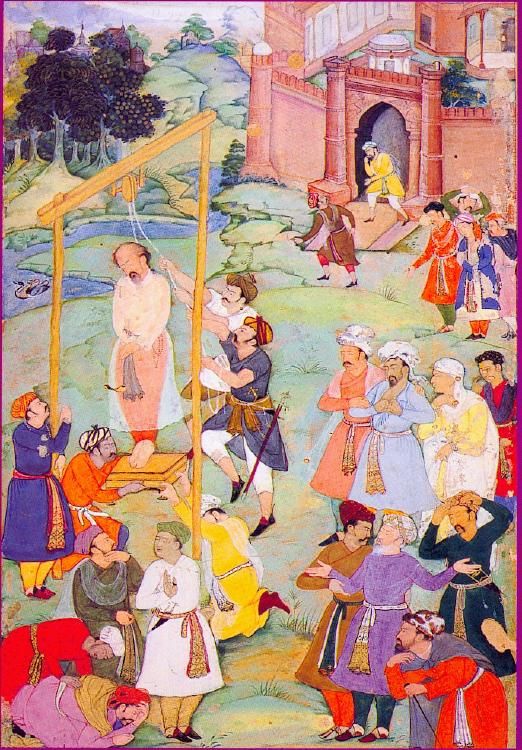FWP:
SETS == DOUBLE ACTIVATION
DROP/OCEAN: {21,8}
SNIDE REMARKS ABOUT FAMOUS LOVERS: This verse is part of what might be called a snide-remark-about-famous lovers series. Kohkan, poor conventional devil, was not able to die without an axe, as we learn in {3,6}; it seems in {42,6} that he had trouble bringing his stonework to life; it was beneath him to do such work in the first place, as {101,2} points out. We learn of his inferior craftsmanship in {105,4x}, and his vulnerability to Khusrau in {165,4x} and {200,5x}. His naivete apparently comes in for sarcasm in {174,7}; his taking the easy, suicidal way out is deprecated in {204,3}.
Majnun was a mere schoolboy
when the lover was already mystically adept (at least, on the most common
reading), as we learn in {61,3}. And now Mansur,
the great mystic adorer of the divine Beloved, is held up for ridicule for
his passionate excesses. A similar treatment is given to Majnun in {159,5}.
In {194,5}, it's poor Zulaikha who comes
in for a sneer at her naively unfulfilling dreams. And in {208,10}, Majnun is actually bad-mouthed by Laila. According to {277x,6}, Qais was only, vainly, absurdly, imitating the lover himself.
Ghalib is partial to drop/ocean imagery, for more on this series, see the discussion of {21,8}, a verse which itself echoes Mansur's words in a drop/ocean context.
The wonderfully versatile, doubly activated phrase tunuk-:zarfii , literally 'small-capacitiedness', is the hinge on which the verse turns. The idea of 'capacity' can have a general sense, just as it does in English, of 'ability, skill, capability', and that's what we think of first. And rightly so, for that meaning is indeed relevant-- Mansur is too clumsy and inept to keep his mystical passion secret as a proper lover should. But on second thought we do a delighted double-take, for we realize that the literal meaning is even more relevant: :zarf is, literally, a quality possessed by a 'receptacle' or 'vessel', something that actually holds liquids-- like drops of water. ('Capacity' in English has the same literal meaning as well-- it measures the amount of liquid a vessel can hold.) Compare {237x,1}.
Mansur is thus too small a vessel, and he overflows, as Nazm wittily expresses it. The speaker, by contrast, has more 'capacity', and can contain the mystical 'oceanic feeling' without letting it splash out over the edges and run into the streets. What is usually seen as a virtue (Mansur's wild, heedless, self-less passion) is turned into a slightly ridiculous defect, a cause for pity. How much superior it is to have all the same feelings, but keep them 'contained' within one's more capacious spirit!
Of course, if that seems pompous or overblown, the verse
can easily be read as tongue-in-cheek. The speaker is perhaps doing a sour-grapes
spin on Mansur's feat, belittling it by arbitrarily changing the desired behavior
from wildness to self-control. (Sufis of different persuasions have had the same back-and-forth arguments over the centuries.) And indeed, doesn't the verse have a slightly
defensive, protesting-too-much quality? The lover knows that he may never
have the good fortune to die humiliatingly in public for his love (see {19,4}),
however much he seeks this honor-- but Mansur achieved not only that, but
eternal fame as well! Who would not be inclined to vent his feelings in the
occasional snide remark? Think how much :zarf it would
take to refrain.

Nazm:
That is, I too am that drop that would be obliterated in the sea. That is, I too have the special rank of being obliterated in the Self [of God]. But Mansur's capacity was small-- he overflowed. (105)
== Nazm page 105